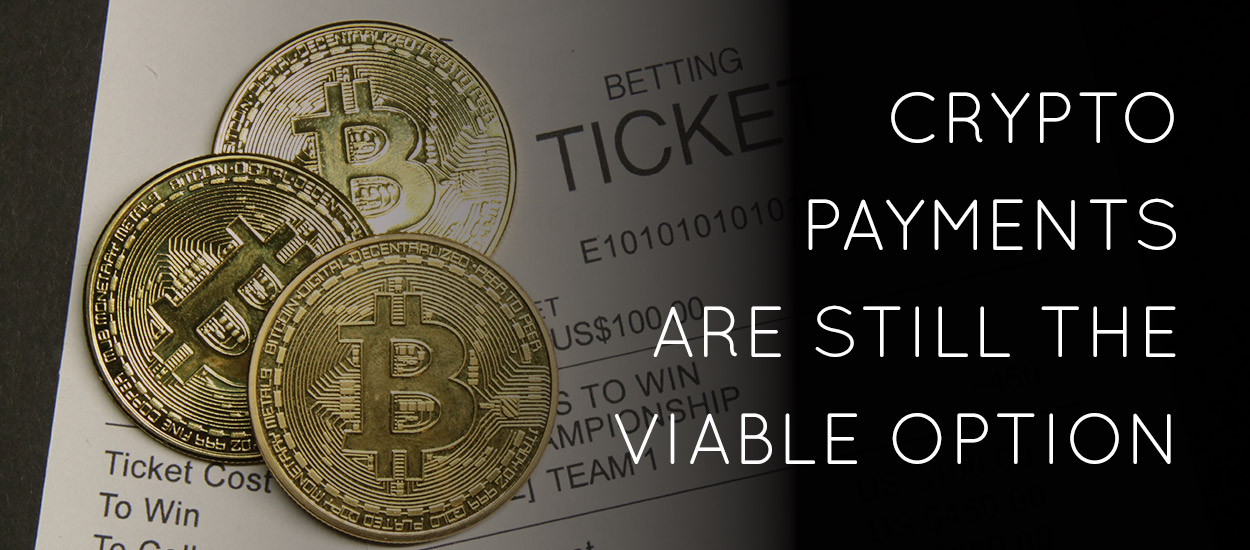Cryptocurrency offers big benefits to online bettors
One of the big differences between regulated gambling sites in the North America and offshore sites is the ability to pay and withdraw with cryptocurrency. As part of the regulations of receiving a license in Ontario, all payments and bets must be made in Canadian dollars and almost every U.S. state has a rule that says all payments (both deposits and withdrawals) and wagers must be done in U.S. dollars. Offshore, however, the ability to pay or withdraw, and even bet, with crypto is not a concern.
Some sites only allow payments by Bitcoin (BTC), some allow BTC, Ethereum (ETH) or Litecoin (LTC), but BetOnline, Heritage, BetAnySports, Bovada and a few others allow a host of crypto for payments.  In fact, BetOnline allows payments with 16 different cryptocurrencies and I have been told by the site that they are always willing to add additional cryptocurrencies as demand warrants. All crypto payments are converted to USD and bets are made in USD, but withdrawals are processed back in the crypto used to deposit. None of these sites allow betting with crypto, but there are sites that do. That said, those sites all have measures in place to ensure the payments are at the current price of the cryptocurrency, which will be discussed later.
In fact, BetOnline allows payments with 16 different cryptocurrencies and I have been told by the site that they are always willing to add additional cryptocurrencies as demand warrants. All crypto payments are converted to USD and bets are made in USD, but withdrawals are processed back in the crypto used to deposit. None of these sites allow betting with crypto, but there are sites that do. That said, those sites all have measures in place to ensure the payments are at the current price of the cryptocurrency, which will be discussed later.
For the longest time the gambling industry was unwilling to consider crypto payments because they believed it was a fad, plus they said the value of cryptocurrency fluctuates too much. But the sites mentioned have developed their own crypto exchange to monitor and deal with fluctuations in prices and assure they can still pay all salaries and expenses in local fiat currencies.
Benefits for Players
Players generally love payments with crypto because they are anonymous, yet payments can be tracked and viewed on the blockchain. This means that if players don’t want to declare gambling income to the government, they don’t have to worry about an audit trail, since tax agencies have no way to verify who placed a bet or how much they won becuase transactions on the blockchain have no names associated with them. And no offshore company will send a W2-G form to the player like regulated sites must.
Moreover, if a player doesn’t want others to know about their gambling, they won’t receive a statement and be required to explain to anyone why there was a $1,000 deposit to XYZ Sportsbook on their visa statement, since crypto payments are confidential. Also, for the player, transaction costs are far lower than with credit card or other e-wallet solutions, which could be an issue if the book charges the player a fee for withdrawals. Players sometimes also complain that funds are tied down with regulated sites until payments from PayPal or other e-wallet solutions clear the bank, meaning withdrawals can take days to process. Players also have complained that regulated sites require extensive third-party verification, which isn’t an issue for crypto withdrawals.
Safety
Crypto sites are also a deterrent to fraud. Because no personal information is transferred in the payments, the scandals that happened with MGM and Caesars recently and with American poker a few years back are avoided. Hackers have a far more difficult time with crypto than with fiat currencies held on banking apps and sportsbooks that accept crypto payments have a system in place to ensure that all transactions are traced so they do not send currency to the wrong account, make double payments, and sent back payments to the player if there is an issue.
While it’s true there are some crypto exchanges that went under such as FTX, Mt. Gox and QuadrigaCX, this really isn’t an issue for online sites. BetOnline, Heritage, Bovada and other top online sportsbooks have measures in place to guarantee post up funds are kept separate from operating funds and they run their own crypto exchanges meaning nothing would be held at a place like FTX. That is a reason some players have said they feel their crypto is safer at a gambling site than a traditional crypto exchange.
"I had money at Quadriga CX,” Brian from Toronto told me, “And in the end I was scammed out of more than 4 ETH and a lot of LTC because of the owner’s illicit activities. They say Gerald Cotten, (the owner of QuadrigaCX) died of natural causes while doing charity work in India and took the codes with him, but it seems clear to me that he was a scammer who used the funds people sent him to buy crypto as his own piggy bank. I ended up getting involved in a class action lawsuit and got about $200 from the settlement for what is now about $15,000 in crypto at least. And we all know about Sam Bankman-Fried and his scam with FTX. So, I just don’t trust these exchanges anymore. I do, however, still believe in the value of crypto so I now use BetOnline and Heritage and know my crypto is safe with them. After all, these companies have been around forever, are controlled by gambling commissions and I’ve never had any issues with payments. When I need money for expenses, I get crypto sent back to me which I convert to Canadian dollars, but otherwise I just keep it at the book. It works for me. It would be nice if I could do the same with MGM or Caesars given their size and even more certainty they will never go bankrupt, but I am happy with my offshore options."
The benefit of cryptocurrency for the sportsbook is even more significant. Payments are secure, can be verified on the blockchain and are irreversible. Consequently, gambling sites don’t have to be worried about chargebacks from seedy customers, which can happen with credit card payments and some e-wallet solutions, plus the fees are far smaller than with other forms of payments. Some credit card companies can charge more than 3%, which sports books generally have to eat for deposits. As well, there is no requirement for conversion for cross-border payments. And most importantly, it avoids the need to deal with banks.
The UIGEA brought down several offshore sportsbooks simply because the players could not deposit fiat currency to their books nor could they receive payments from reliable sources. Many still remember the days when players would receive cheques on 8 ½ by 11 paper written from a bank in Iceland or Cyprus, which would lead to local banks questioning the player about the source of the funds. It is widely believed that had crypto been available a few years earlier, WSEX would still be around today, since their downfall was the inability to process transactions with their bank. And some of the big-name offshore books today were also likely spared the fate of WSEX, since the payment option allows them to process all U.S. customer transactions with crypto and avoid the global banking system altogether.
Price fluctuations don't affect wagers
One misnomer that some novice bettors have is that if they bet crypto, they will receive the stated crypto win back with no regards to the change in value of the cryptocurrency. I spoke to someone at Lucky Block, which is a crypto only book that takes a variety of sports bets, and he told me that the company is a crypto casino (i.e. all bets are placed and won in crypto), but the company still relies on the exchange prices at the time of bet placement for payouts. This usually isn’t significant on a day-to-day basis, but can be very significant for future bets.
So, for example, if you had bet 0.5 BTC on the Kansas City Chiefs to win the Super Bowl on October 1 at Lucky Block before the start of the season at 8/1 odds, you would not have received 4 BTC in return after the Super Bowl and the player’s account would show the potential win of 4 BTC. Instead, crypto-only sites makes it clear you would win the value of 4 BTC when the 0.5 BTC bet was placed.  On October 1, the value of one BTC was about $27,000 ($108,000 potential win), but on February 11th, the day of the Super Bowl, the value of one BTC was about $48,000. So, when the winner was paid out, he would have received $108,000 or 2.25 BTC, based on the price of at the time of the bet ($48,000) and not 4 BTC, which on February 11th would have been worth $192,000. It sounds confusing, but all of the books I spoke to, both traditional books and crypto only books, have said that they must treat everything using the value of the currency at the time of bet placement, since doing otherwise could put them out of business. That said it could work the other way too. If someone places a future bet now on the L.A. Dodgers to win the NL at 3/1 odds, when the value of one BTC is almost $66,000, then they are expecting to get a return of $264,000, including stake. But if BTC is only worth $33,000 when the bet settles, they will still get $264,000 in their account, but it would show as 8 BTC instead of four. I asked around and couldn’t find a single crypto-only wagering site that pays out the full crypto win and doesn’t adjust for fiat price fluctuations. I’d be happy to hear from any sites where that is the case if they do exist.
On October 1, the value of one BTC was about $27,000 ($108,000 potential win), but on February 11th, the day of the Super Bowl, the value of one BTC was about $48,000. So, when the winner was paid out, he would have received $108,000 or 2.25 BTC, based on the price of at the time of the bet ($48,000) and not 4 BTC, which on February 11th would have been worth $192,000. It sounds confusing, but all of the books I spoke to, both traditional books and crypto only books, have said that they must treat everything using the value of the currency at the time of bet placement, since doing otherwise could put them out of business. That said it could work the other way too. If someone places a future bet now on the L.A. Dodgers to win the NL at 3/1 odds, when the value of one BTC is almost $66,000, then they are expecting to get a return of $264,000, including stake. But if BTC is only worth $33,000 when the bet settles, they will still get $264,000 in their account, but it would show as 8 BTC instead of four. I asked around and couldn’t find a single crypto-only wagering site that pays out the full crypto win and doesn’t adjust for fiat price fluctuations. I’d be happy to hear from any sites where that is the case if they do exist.
Global acceptance for gambling in crypto?
The real question is whether regulated sportsbooks would be willing to come on board and offer crypto for payments if given the chance? There have been forums and sessions devoted to cryptocurrency at the SBC Gambling forums and the general consensus has been that most books would be very interested in allowing payments through crypto due to the lower fees, but they also don’t want to upset the apple cart and feel the only time this will be realized is when there is a central bank digital currency which the governments of the U.S. and Canada own and control. The governments will want an assurance that all bets are tracked, and in the case of the U.S. that any winners are sent a W2-G form so they would be forced to pay taxes on gambling winnings. This could be more difficult with crypto than with traditional payments, which is likely why one session participant last year said that bettors who want to bet with crypto should simply convert to USD and convert any winnings to crypto and keep it in a personal wallet or an exchange, like Kraken.
So, the value of betting on sports or casinos with cryptocurrency is clear and it will likely be in the news even more as the price of Bitcoin and other cryptocurrencies skyrocket. Yet it seems likely that the ability to bet with crypto at a regulated sportsbook in North America, is still far away, which makes offshore betting quite attractive to a lot of gamblers who hold cryptocurrency. Fortunately, for those bettors there are many opportunities to deposit and withdraw with cryptocurrency, including most of the top-rated books on OSGA. And as an added benefit, books like BetOnline offer a 100% crypto match bonus for any first-time clients. They also often have promotions for any bettors who re-deposit with crypto including contest entries, free spins on casino games or boosted odds. It’s an exciting time to be holding crypto, and as the world economy spins out of control it’s likely the value of crypto will only get better. And personally, one of my biggest regrets to date was not buying BTC at $3 each when I first started writing about the currency in 2011. Of course, it’s not too late to buy now and it’s quite possible in a few years I’ll be looking at BTC again and wondering why I didn’t buy any at $66,000 each when I had the chance.
Read insights from Hartley Henderson every week here at OSGA and check out Hartley's RUMOR MILL!







































